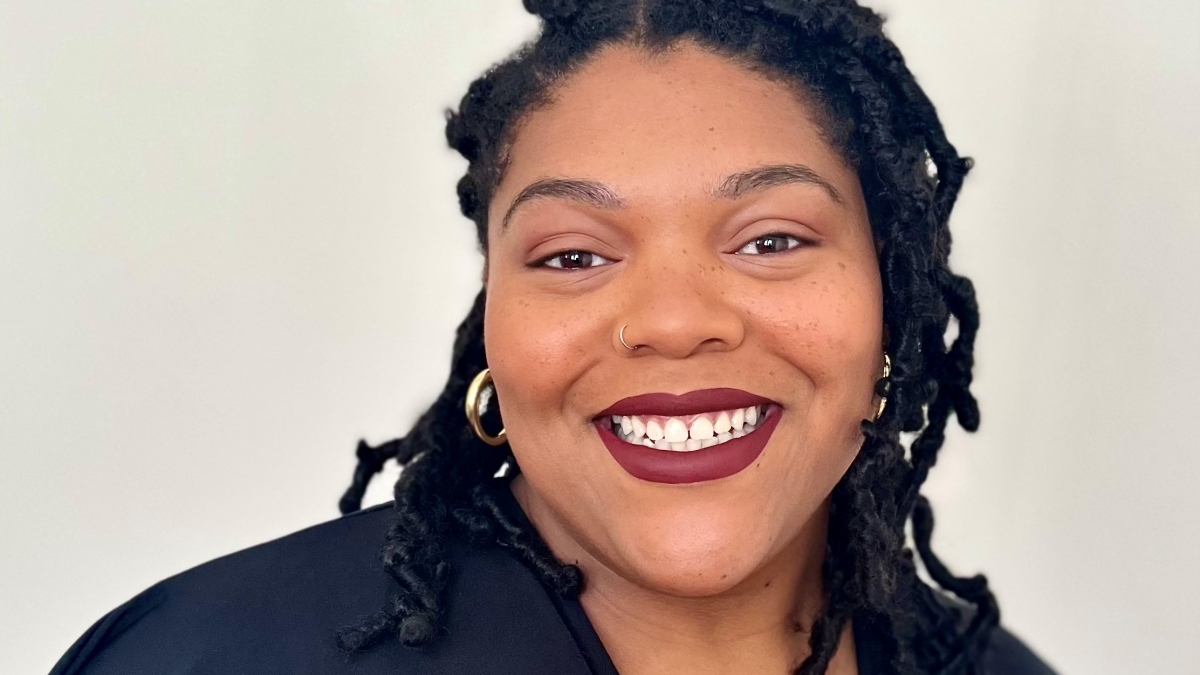Student who withdrew from college twice returned to become Outstanding Graduate

Makiyah Murray is the ASU School of Social Work’s spring 2023 Outstanding Graduate.
Editor’s note: This story is part of a series of profiles of notable spring 2023 graduates.
Makiyah Murray decided she was going to get a college degree — in part because so few people in her town had one.
Murray, who is Black, said she grew up in “a tiny community" where less than 50% had college degrees. Of that, only 14% were Black.
“My mom was a single mom with two jobs and came from a disadvantaged and impoverished background. Being poor in a disadvantaged community, I grew up dealing with the child welfare system,” said Murray, the School of Social Work’s spring 2023 Outstanding Graduate. “At 16, I entered the foster care system until I aged out of foster care at 18.”
While in foster care, Murray described feeling disconnected from the caseworkers assigned to her, who all were white.
“They didn’t treat me badly. It just felt like they really couldn’t connect with me or understand what I was going through,” Murray said. “It’s not that they didn’t want to help; they couldn’t understand how to help.”
In fall 2006, the Ypsilanti, Michigan, resident started college in her home state but dropped out by summer 2007. She worked as a hairstylist for many years until recently, when she decided to try college again, encouraged by a therapist and psychologist who was also a Black woman.
“She challenged me to go back to school. She believed in me and in my story and could see that I wanted to do something bigger,” Murray said. “(Social work) is one thing I could do in life, without thinking: to fight for other people and help them navigate complex situations.”
Even then, as a 30-year-old Arizona State University student, she said she didn’t fully understand financial aid and was forced to withdraw from school after she ran out of money.
About a year later, still feeling “low and hopeless,” she was determined to continue her education at ASU. Murray found a way forward through the Starbucks College Achievement Plan. The plan, a partnership between ASU and Starbucks, offers 100% tuition coverage for eligible U.S. partners Starbucks employees are referred to as partners. to pursue their first undergraduate degree through ASU Online.
“I didn’t believe it was true, because it was ASU,” where she had just withdrawn. “I was astonished. I came out of my shock and applied and I became a partner,” she said. Murray also received the Tau Sigma Leadership Scholarship.
Murray is graduating with a Bachelor of Arts in community advocacy and social policy.
Read on to learn more about Murray’s ASU journey:
Editor's note: Answers were edited for length and clarity.
Question: What’s something you learned while at ASU — in the classroom or otherwise — that surprised you or changed your perspective?
Answer: That’s an easy one. I learned that I was capable of achieving greatness! For some, that may seem like a given but for me, it was a turning point in what I believed was possible. Coming from a small town in a community at the margins, I truly believed that my future was predestined to what I saw around me. Then, in the fall 2021 semester, I earned straight A’s after a withdrawal the semester before. A short time later, I was invited to join Tau Sigma Honor Society, challenging every limiting thought I had.
Q: Why did you choose ASU?
A: I chose ASU for two reasons. The first reason is its reputation. Online education was the only way I could complete my degree. However, not all online programs are reputable. ASU programs, especially in the School of Social Work, had a spectacular reputation that was known and recognized nationally and globally. The second reason is the Starbucks College Achievement Plan. After depleting my federal financial aid at the beginning of my second year at ASU, I was forced to discontinue my courses. I was devastated and couldn't afford tuition costs, but I knew that ASU is where I needed to be. After discovering the plan, my dream seemed to come back into focus and I was able to continue pressing forward.
Q: Which professor(s) taught you the most important lesson while at ASU?
A: Judith Bass and Meka Allen taught me valuable lessons in challenging my thinking and exploring uncharted academic areas. Professor Bass, from whom I have had the pleasure of taking two courses, set me on a path to exploring career opportunities in statistical data and policy through great engagement and feedback in class. Professor Allen, in a single comment on an assignment, challenged my thinking and language around equity, giving me a deeper understanding of how to approach inequity. Although these moments may seem trivial to onlookers, for me, they guided me in the direction of deepened passion.
I would be remiss if I didn’t mention my support team, Ellen Lagerman (student support coordinator) and Danielle Winhold (academic advisor), who have been rallying behind me in some major ways to continue pushing me to the finish line.
Q: What’s the best piece of advice you would give students?
A: Keep a routine that works for you. This is especially true for online scholars. A routine allows you to stay ahead of due dates and have time for extracurricular activities. For me, this meant starting my day at the same time every day and completing a small portion of all assignments for the week every day, no matter the due date. This allowed me to take more classes and have more time for self-care.
Q: As an online student, what was your favorite spot for power studying?
A: As a Starbucks College Achievement Plan Scholar, my obvious favorite place for power studying was Starbucks. I loved studying at Starbucks because I could (get plenty of) caffeine, and it was just the right amount of background noise for focusing. However, during times when I needed hyper-focus to finish bigger projects, my local library was my go-to. There, I could reserve a quiet study space where there were no distractions.
Q: What are your plans after graduation?
A: In fall 2023, I will start a dual master's program at the Brown School at Washington University in St. Louis. I will study for master’s degrees in social work and in social policy. Over the summer, I hope to volunteer with CASA (Court Appointed Special Advocates) in St. Louis, to support our strained child welfare system.
Q: If someone gave you $40 million to solve one problem on our planet, what would you tackle?
A: I would fund transitional support programs for foster children who are aging out of the foster care system. Every day, children under state care turn 18 and may choose or are forced to survive as an adult. Lack of representation, funding and institutional structures all play a factor in transition outcomes. My funding would include a pilot program to employ equitable case management and innovative permanency planning for youths with an imminent trajectory to age out of foster care. If we can accept that adolescent minds, particularly the portion responsible for decision-making, are not fully mature until their mid-20s or later, then we must also be accountable for nurturing healthy development beyond 18.
More Sun Devil community

Tested tips for taking exams
With May quickly approaching, many students are starting to prep for their most important tests of the year — final exams.Toni…

School of Transborder Studies celebrates 15th anniversary
During the summer before his freshman year at Arizona State University, Salvador Macias participated in the AGUILA Youth…

Barrett program unlocks study abroad for first-year honors students
Twenty first-year students from Barrett, The Honors College at Arizona State University are spending their second semester…

